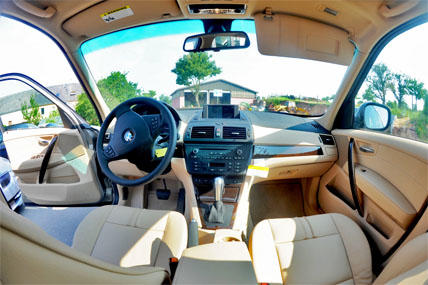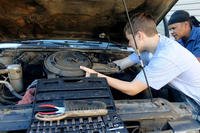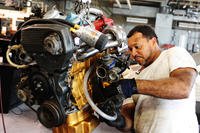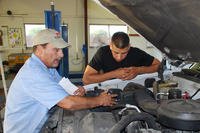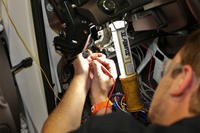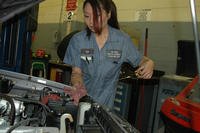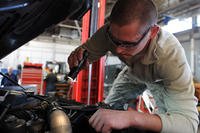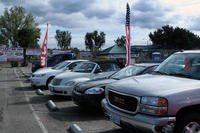Use the Internet to your advantage when it's time to buy or sell -- and guard against online fraud and other risks, too.
If you wanted to buy or sell a car more than a decade ago, you'd turn to the local classifieds -- circling reviews that enticed you to take a test drive or pay for a few lines touting the glories of your old ride.
Today, it's more about tapping into the vast, online marketplace, where photos, even videos, accompany almost never-ending electronic listings. "The Internet has been a total game changer in all forms of commerce, particularly in individual-to-individual sales," says Katherine Hutt of the Better Business Bureau.
But, online convenience brings risks. After all, the Internet introduces strangers -- in cyberspace and eventually in person when cars and keys change hands. BBB research shows eight of 10 top scams in 2011 were Internet-related. And when potential buyers and sellers meet, they may encounter someone out to steal a vehicle on a test drive, rob them of other personal property -- or worse.
To help protect yourself, it's important to understand the dangers. USAA's Steven Thompson, an assistant vice president at USAA Bank, says online buyers and sellers face three primary risks:
- Cybercrime and ID theft.
- Personal safety.
- Transaction fraud.
Here's how to fight back.
Avoiding Cyber Crime and ID Theft
Follow these common-sense practices to ward off online fraudsters, whether you're buying, selling or shopping around.
FOR EVERYONEDon't share personal information. Don't use your address or other data in online ads or in responding to them. Hutt even suggests creating a dedicated email address for online business dealings.
Update computer safeguards. Install up-to-date anti-virus, anti-spyware and firewall software.
Avoid clicking links in emails from strangers. The wrong click can send you to a fraudulent site or install a virus on your computer.
Keep an eye on your credit reports for suspicious activity. CreditCheck Monitoring® by Experian offers immediate access for you to review your credit reports.
Limit your audience. Craigslist and eBay popularized buying and selling goods online. But you can access a limited market with an online service such as the new USAA sell-service, where you can post or peruse online ads from the USAA community. "That really narrows down the audience to people whom you would generally do business with," Hutt says. Even with a closed forum, it is important to protect yourself by taking the types of precautionary steps in this article.
FOR BUYERSAuthenticate a listing. Do a Google image search for the featured make and model to see if the exact same image pops up elsewhere. If it does, that should raise red flags about whether the image has been copied from another site. Likewise, buyers can search for a listing's phone number by putting it in quotation marks in each entry field, says Hutt. "They'll find any other place online where the number has been used," she says, explaining they can uncover whether it belongs to a different business or the true seller.
Test a site's legitimacy. Hutt tells of one site that impersonated the online identity of a recently closed car dealership. Scammers took its name and address, but copied car listings from other dealers across the country, hoping naïve buyers would send money for a car the fake company didn't even own. The site's home page photo of a supposed car lot was actually a photo of cars parked at a shopping center. To verify the legitimacy of a business use the Better Business Bureau's website.
FOR SELLERSSellers also should only use legitimate car-selling sites. The Better Business Bureau's website can verify the legitimacy of a business.
Maintaining Personal Safety
When it comes to meeting for test drives and initial negotiations, take steps to avoid putting yourself at risk:
FOR EVERYONENever arrange to meet at a residence -- yours or someone else's.
FOR BUYERSMake the deal in public. Meet in a very public, well-lit place, such as a parking lot at a mall or supermarket -- even a police station, says Hutt.
Take someone with you. Automotive expert Lauren Fix, known as The Car Coach®, always takes her husband with her to meet potential buyers. "You don't know the people," she says. "They may come with a handful of cash -- or with a weapon."
FOR SELLERSBeware of tagalong "friends." Industry experts warn of unscrupulous "buyers" who have other agendas, such as bringing friends who may break into your house to score electronics while they are out with you for a "test drive."
Use your best judgment about whether to go on the test drive with a stranger. Fix recommends the ride-along, lest you never see the car again. But Hutt warns against driving with someone whose driving record and habits you don't know. Others recommend asking for some kind of collateral -- the keys to the car they drove, for instance -- before letting a potential buyer go for a solo drive.
Steering Clear of Transaction Fraud
FOR EVERYONETrust your instincts. Whether buying or selling, proceeding with online transactions comes down to your instincts. "Trust your gut," Hutt says. "If something doesn't quite seem right, walk away."
FOR BUYERSAlways test drive the car. "It's risky to buy sight-unseen," Hutt warns. "Even if it's a collector's car located in a neighboring state, it's worth the drive there to pick it up."
For used cars, ask for a vehicle identification number and purchase the CARFAX® Vehicle History Report to see if it's been stolen or damaged. Fix warns that not every car makes it into the CARFAX database, so it's best to have a trusted mechanic check under the hood before you buy.
Ask for a copy of the title to the car. Make sure the car you're buying is the one being sold. And if the seller can't produce it, walk away, Hutt says.
Research the value of the car to ensure the asking price is fair. Online car sites, such as the Military.com Car Buying Center , Kelly Blue Book, Edmunds.com and the National Automobile Dealer Association, can help you understand your car's market value.
Be suspicious of low-mileage claims. If an ad touts 30,000 miles on a 5-year-old car, ask the seller to take a picture of the odometer and email it to you. If they balk, you've spotted a scam.
Take your time. "If anyone tries to rush you, it's a red flag," Hutt says.
Ask for all copies of the keys to the vehicle. Scammers could make copies of the key and the car you purchase may be driven away by morning.
FOR SELLERSJust say no. Never wire money back to buyers for overpayment before their check clears. Hutt says the BBB hears tales of scammers who send a check for too much money and then ask the seller to wire the difference. When the original check fails to clear, the seller is out the money he wired -- and perhaps the car.
Independently verify a cashier's check by calling the issuing bank. Use a phone number you find on the bank's website -- not the one printed on the check itself, in case the check itself is a fake.
Hold on to the title and keys until the check clears.
Craft a complete bill of sale that includes the phrases "sold in 'as-is' condition" and "no warranties expressed or implied," recommends Fix.
